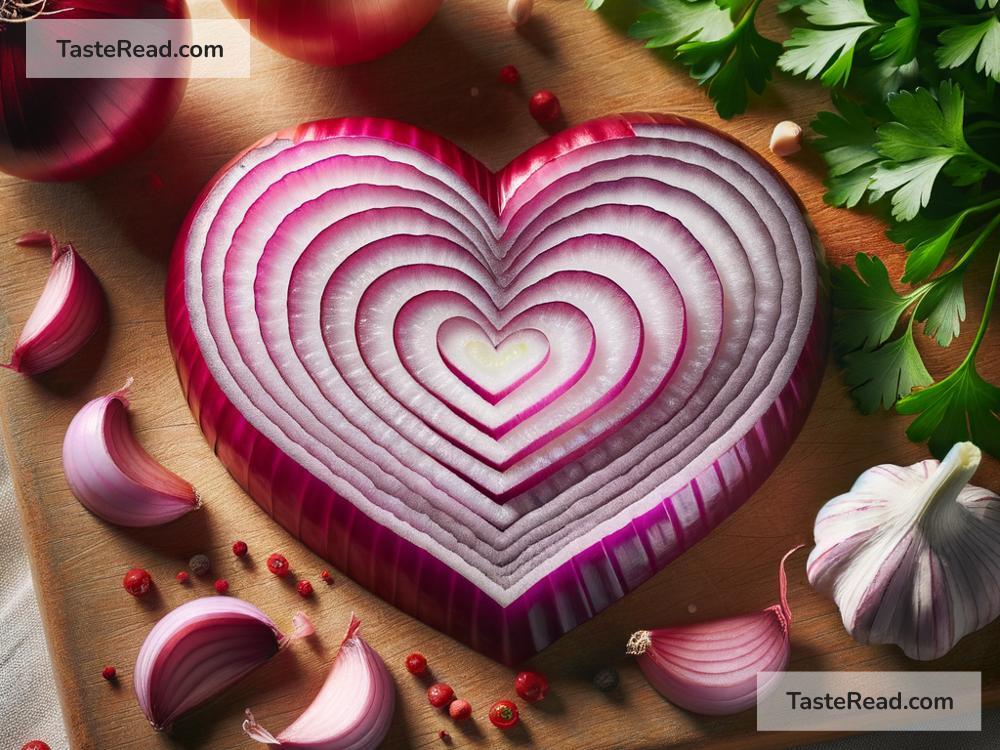The Surprising Benefits of Onions for Heart Health
When you think of foods that help your heart stay healthy, onions might not be the first thing that comes to mind. Most people think of onions as just a flavorful ingredient for their favorite dishes. But onions are more than just tasty—they’re packed with nutrients and compounds that can play a big role in improving heart health. Let’s take a closer look at why this humble vegetable deserves a little more attention.
What Makes Onions So Special?
Onions are a type of vegetable that belongs to the allium family, which also includes garlic, shallots, leeks, and chives. They come in many varieties, such as red, yellow, and white onions, each with a slightly different flavor. What makes onions stand out is their wealth of health-promoting nutrients and antioxidants.
Here are some key components in onions that benefit the heart:
1. Quercetin: This powerful antioxidant helps fight harmful free radicals in your body, reducing inflammation and improving heart health.
2. Sulfur Compounds: These compounds, which give onions their distinct smell and flavor, have been linked to better blood circulation and lower cholesterol levels.
3. Fiber: Onions are a good source of dietary fiber, which can help lower blood pressure and support overall cardiovascular health.
4. Vitamin C: Known for boosting immunity, vitamin C also strengthens blood vessels and reduces the risk of heart issues.
How Do Onions Help Your Heart?
Let’s explore the different ways onions can protect and improve the health of your heart.
1. Lower Blood Pressure
High blood pressure is one of the leading risk factors for heart disease. Studies suggest that the antioxidant quercetin found in onions helps relax blood vessels and reduce blood pressure. It may also improve blood flow throughout the body, making it easier for your heart to pump blood.
2. Reduce Cholesterol Levels
Too much “bad” cholesterol (LDL cholesterol) increases the risk of clogged arteries and heart attacks. Onions contain sulfur compounds that can help break down fats and reduce levels of bad cholesterol. At the same time, they may increase levels of “good” cholesterol (HDL cholesterol), which helps keep arteries clear.
3. Prevent Blood Clots
Your blood needs to clot after an injury to stop bleeding, but too many clots can lead to dangerous conditions like strokes or heart attacks. Onions contain compounds that act as natural blood thinners, reducing the risk of harmful clots forming in your arteries. This ensures your blood flows freely and your heart stays healthy.
4. Fight Inflammation
Chronic inflammation is another major contributor to heart disease. It damages blood vessels and makes it harder for your heart to do its job. Onions are loaded with antioxidants like quercetin, which fight inflammation and protect your heart from damage. This makes onions an easy, natural way to defend against heart disease.
5. Support a Healthy Weight
Carrying excess weight puts extra strain on your heart and raises the risk of high blood pressure and diabetes. Onions are low in calories, high in fiber, and add a burst of flavor to your meals, making them a great food to include in a heart-healthy diet. Fiber keeps you feeling full longer, which can help control overeating and support weight loss.
How to Add Onions to Your Diet
Adding onions to your daily meals is simple and affordable. Whether you love raw onions in salads, caramelized onions in sauces, or roasted onions in soups, the options are endless. Here are a few tips to help you incorporate onions into your diet:
- Eat them raw: Raw onions contain higher levels of sulfur compounds, which are great for heart health. Chop them up and sprinkle them on salads or sandwiches.
- Cook them wisely: If you prefer cooked onions, try roasting, grilling, or sautéing them with olive oil instead of deep-frying them. This keeps their nutrients intact while adding delicious flavor to your dishes.
- Make onion soup: A warm bowl of onion soup is not only comforting, but it’s also packed with heart-healthy antioxidants.
- Blend them in smoothies: Yes, you read that right! Adding a small piece of raw onion to a vegetable smoothie can boost the flavor and nutrition without overwhelming the drink.
- Use them in dressings or dips: Mix raw onions into homemade salsa, guacamole, or salad dressings for an extra health boost.
A Few Considerations
While onions are healthy and packed with benefits, it’s important to enjoy them in moderation. Eating too many onions can cause digestive discomfort for some people because of their high sulfur content. If you have a sensitive stomach, try cooking onions to make them easier to digest.
Additionally, while onions can help reduce risk factors for heart disease, they’re not a substitute for other parts of a heart-healthy lifestyle. Regular exercise, a balanced diet, and stress management are all key to keeping your heart strong.
The Bottom Line
Onions might not seem like a superfood at first glance, but their heart-healthy benefits are truly impressive. From lowering blood pressure to reducing cholesterol and fighting inflammation, this humble vegetable packs a serious punch when it comes to protecting your heart.
So, the next time you’re chopping onions for a recipe, remember—they’re not just adding flavor to your food, but also adding years to your life. Whether you enjoy them raw or cooked, make onions a regular part of your meals and give your heart the care it deserves.


